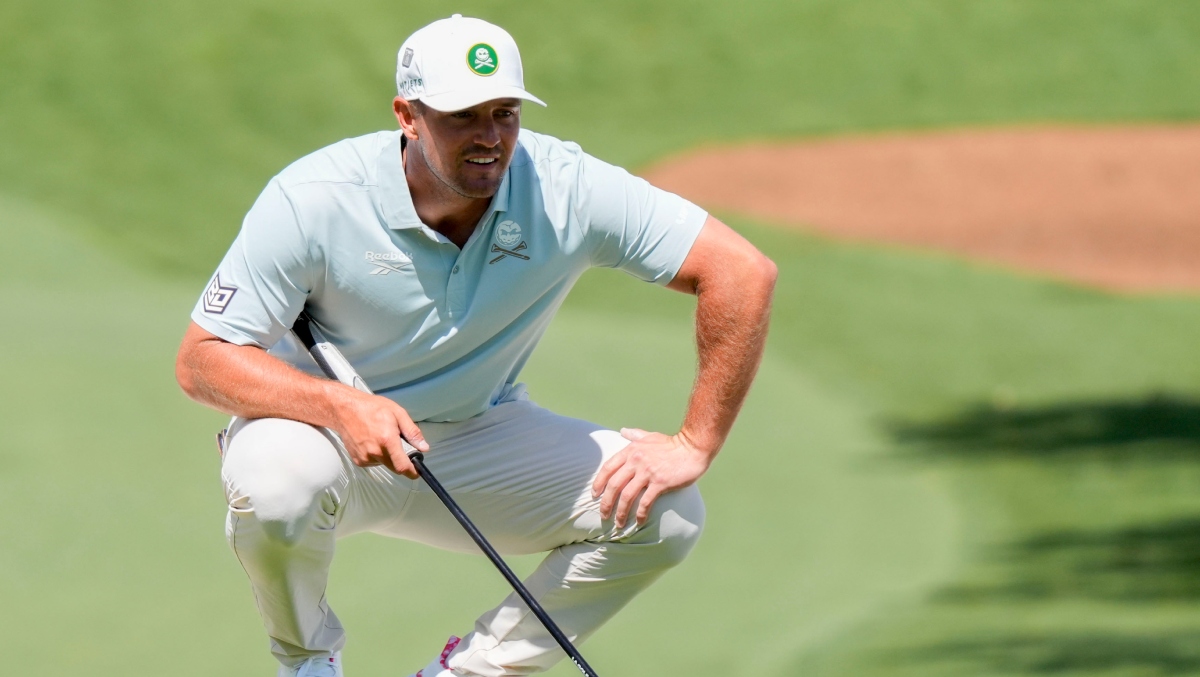Title: DeChambeau ESPN & Masters Controversy: Unpacking the Fallout
Meta Description: The DeChambeau-ESPN-Masters controversy explodes: We analyze the fallout, exploring the impact on golf, media coverage, and future events.
Editor's Note: The recent controversy surrounding Bryson DeChambeau, ESPN's coverage, and the Masters Tournament has ignited a firestorm of debate. This article delves into the key aspects of this complex issue.
Why It Matters: The DeChambeau controversy transcends mere sporting news; it highlights crucial intersections between athlete-media relations, sponsorship deals, and the broader perception of professional golf. Understanding this situation offers insights into how these entities interact and influence each other. This analysis uses semantic keywords like "golf controversy," "athlete-media relations," "Masters Tournament backlash," and "Bryson DeChambeau criticism" to ensure comprehensive search engine optimization.
Key Takeaways:
| Aspect | Summary |
|---|---|
| Media Criticism | ESPN's coverage faced accusations of bias and sensationalism. |
| DeChambeau's Response | DeChambeau's reactions fueled further debate and criticism. |
| Masters Tournament Impact | The controversy overshadowed aspects of the tournament itself. |
| Sponsorship Implications | Potential impact on DeChambeau's sponsorships and endorsements. |
| Future of Coverage | Questions raised about future media coverage of professional golf events. |
DeChambeau Coverage: ESPN & Masters Under Fire
Introduction: The recent controversy surrounding Bryson DeChambeau, involving ESPN's broadcast of the Masters Tournament and subsequent public reactions, has sparked significant debate within the golfing community and beyond. This in-depth analysis explores the various facets of the controversy, its implications, and potential future ramifications.
ESPN's Coverage: Bias or Balanced Reporting?
Introduction: ESPN's role in the DeChambeau controversy is paramount. Accusations of biased and sensationalized coverage have dominated discussions, questioning the network's journalistic integrity.
Facets:
- Role of Commentary: Analysis of the commentary during the broadcast, focusing on perceived negativity towards DeChambeau.
- Examples of Criticism: Specific instances from the broadcast cited as examples of biased reporting.
- Risks of Sensationalism: The potential for sensationalized coverage to damage the reputation of both the athlete and the broadcaster.
- Mitigation Strategies: Possible steps ESPN could take to improve objectivity and balance in future broadcasts.
- Impacts on Viewership: The influence of biased coverage on viewers' perception of the tournament and the athlete.
Summary: ESPN's handling of the DeChambeau narrative raises vital questions about the balance between compelling storytelling and objective reporting in sports broadcasting.
DeChambeau's Public Response: Fueling the Flames?
Introduction: DeChambeau's response to criticism has played a significant role in escalating the controversy. Analyzing his actions helps understand the dynamics of the situation.
Further Analysis: Examination of DeChambeau's public statements, social media activity, and interactions with the media. Discussion of the potential impact of his responses on public opinion and his own image.
Closing: DeChambeau's responses, while understandable given the pressure, potentially exacerbated the conflict. The need for athletes to carefully consider their public statements is highlighted.
Information Table: Key Players and Their Roles
| Player/Entity | Role | Perceived Impact on Controversy |
|---|---|---|
| Bryson DeChambeau | Central figure; subject of media scrutiny | Significant escalation |
| ESPN | Broadcaster; provider of tournament coverage | Significant role in controversy |
| Masters Tournament | Event setting for the controversy | Negatively impacted by the fallout |
| Golfing Community | Audience; observers and commentators | Diverse opinions and reactions |
| Sponsors | Potential stakeholders impacted by the fallout | Uncertain, but potential risks |
FAQ
Introduction: This section answers frequently asked questions surrounding the DeChambeau-ESPN-Masters controversy.
Questions:
- Q: Was ESPN's coverage unfairly biased against DeChambeau? A: Many viewers and commentators believed so, citing specific examples of negative commentary.
- Q: How did DeChambeau react to the criticism? A: DeChambeau responded publicly, often escalating the conflict.
- Q: What impact did the controversy have on the Masters Tournament? A: It overshadowed much of the sporting action.
- Q: Will this affect DeChambeau's sponsorships? A: The possibility of negative impacts on his endorsements exists.
- Q: How will this affect future media coverage of golf? A: It raises concerns about journalistic responsibility in sports coverage.
- Q: What lessons can be learned from this controversy? A: Increased awareness of the complex interplay between athletes, media, and sponsors.
Summary: The FAQ section clarified several key points of the controversy, highlighting the diverse opinions surrounding ESPN's reporting, DeChambeau's reaction, and the overall impact on golf.
Tips for Navigating Athlete-Media Relations
Introduction: This section offers insights into managing the complex relationship between athletes and the media.
Tips:
- Maintain Open Communication: Encourage transparent communication between the athlete and their media representatives.
- Professionalism Matters: Emphasize the importance of maintaining professionalism during interviews and interactions.
- Strategic Messaging: Develop a consistent and thoughtful communication strategy.
- Crisis Management Plan: Prepare a crisis management plan to address potential controversies.
- Social Media Savvy: Implement a social media strategy to control the narrative.
- Choose Reputable Media: Prioritize collaborations with reputable media outlets.
Summary: Proactive strategies are essential to mitigate potential damage and maintain a positive public image in athlete-media relations.
Summary of DeChambeau ESPN & Masters Controversy
Summary: This article provided a comprehensive analysis of the recent controversy surrounding Bryson DeChambeau, ESPN's Masters coverage, and the subsequent fallout. We examined the various perspectives, the implications for future media coverage of golf, and provided practical advice for improving athlete-media relations.
Closing Message: The DeChambeau-ESPN-Masters controversy serves as a powerful reminder of the intricate relationship between athletes, media outlets, and the public. Moving forward, fostering open dialogue and responsible reporting is paramount to maintaining the integrity of professional sports.

